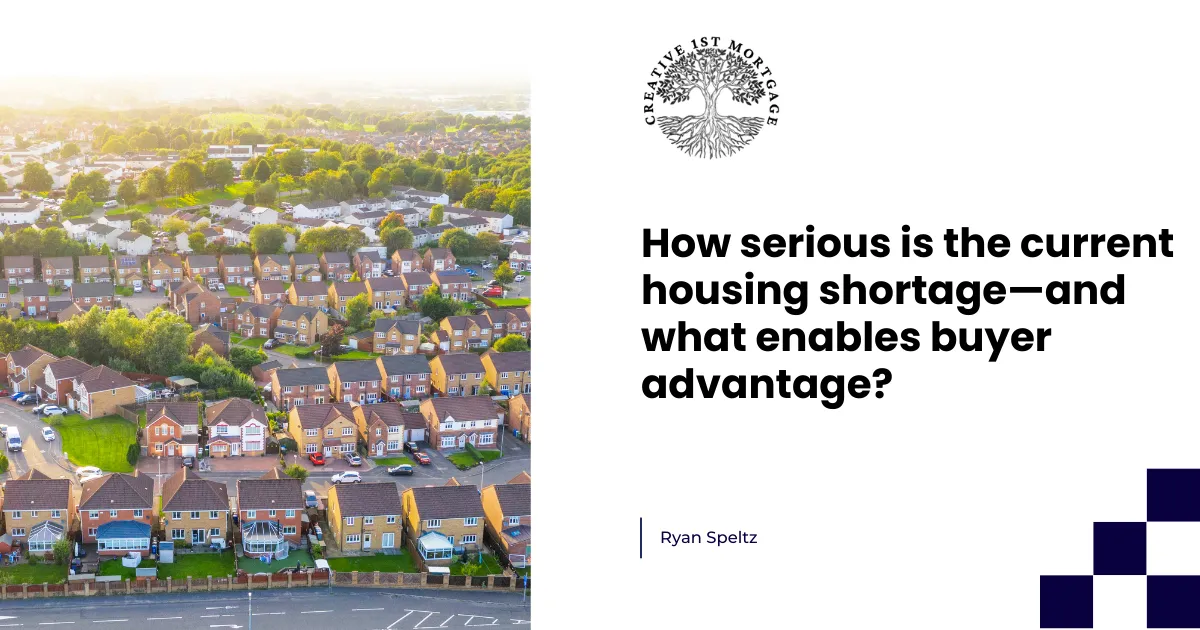
How Serious Is the Current Housing Shortage And What Gives Buyers an Edge?
A Deep and Growing Gap Between Demand and Supply
The housing shortage we face today is not a temporary hiccup — it’s the result of years of underbuilding, growing household demand, and systemic barriers that limit new construction. Experts estimate the U.S. is short nearly 4 to 5 million homes, with some regions suffering far worse shortages than others.
Vacancy rates for owned homes are historically low, and housing construction has struggled to keep pace with household formation. As a result, many markets are in a prolonged state of imbalance, where demand far outstrips supply.
Why the Shortage Persists: Key Constraints
1. Zoning, regulation, and land-use limits
In many places, local zoning rules, permitting delays, and minimum lot-size requirements prevent the types of housing (like townhomes, duplexes, and smaller single-family homes) that would help close the gap.
2. High construction costs and input bottlenecks
Rising costs for labor, materials, land, and regulatory compliance make it more expensive to build new homes — especially more affordable ones.
3. Fragmented local markets
Housing markets aren’t uniform. Some cities or regions have enough supply relative to demand; many do not. So even if national numbers look “better,” local shortages can still be severe.
4. Decades of underbuilding
Following the Great Recession, the rate of housing construction lagged for years. That cumulative underbuilding now amplifies the imbalance.
What this Means for Buyers: The Advantage Shifts
While a shortage might seem like it favors sellers, that doesn’t mean buyers have zero leverage. Here are factors and strategies that give buyers advantage — or at least mitigate the disadvantage:
A. More inventory — but not always affordable inventory
Some markets are beginning to see modest increases in listings. However, much of that inventory is still priced above what middle-income buyers can afford. Even so, more options give buyers more choice and the ability to comparison-shop.
B. Slower price escalation in some areas
In overheated markets, price growth is cooling. This offers buyers the chance to negotiate more effectively, especially in neighborhoods where demand is slightly waning.
C. Incentives from builders and sellers
To attract buyers, builders and sellers sometimes offer concessions — covering closing costs, offering rate buydowns, staging upgrades, or financing incentives.
D. Using data and local insights
A well-informed buyer can spot neighborhoods where supply is loosening or where growth is just starting. Real estate agents with local market knowledge can identify under-the-radar deals before competition is intense.
E. Locking in favorable terms early
In a tight market, securing favorable interest rates, timing your purchase well, or choosing financing programs with lower down payments or flexible terms can give you an edge.
How Buyers Should Approach This Market
Be preapproved and ready to act. In a competitive market, waiting too long can cost you.
Focus your search. Know the segments or neighborhoods with relatively lighter competition or upward trends.
Negotiate creatively. Ask for seller concessions, closing cost help, or rate incentives.
Stress-test your budget. Because housing costs are under pressure, make sure your numbers hold up even if taxes, insurance, or rates rise.
Work with a mortgage advisor and agent together. The right professionals can help you structure offers and financing strategically in a shortage-driven market.
The bottom line: the housing shortage is very real, widespread, and long-lasting — but there are levers that buyers can use to improve their position. With preparation, flexibility, and insight, you can still make smart homebuying moves — even when inventory feels tight.
Sources:
National Mortgage Professional, “U.S. Housing Shortage Hits Record High”
U.S. Chamber — “The State of Housing in America”
Realtor.com — “Housing Supply Gap Reaches Nearly 4 Million in 2024”
National Association of Realtors — Housing Shortage Tracker
Urban Institute — “Bringing the Housing Shortage Into Sharper Focus”
Freddie Mac — “The Decline in Relative Housing Affordability and …”
American Progress — “Americans Recognize Housing Affordability Crisis”




